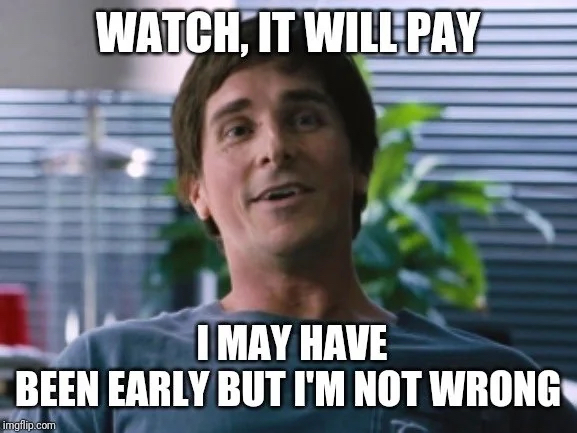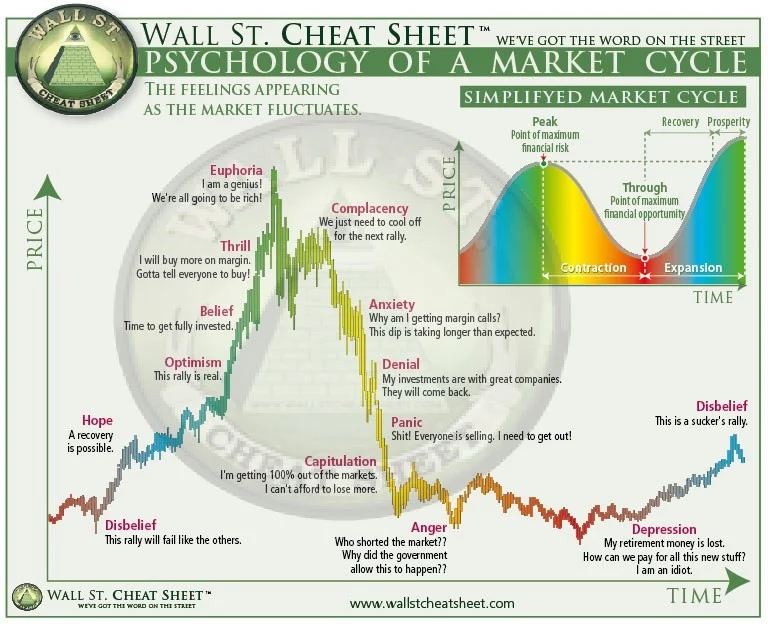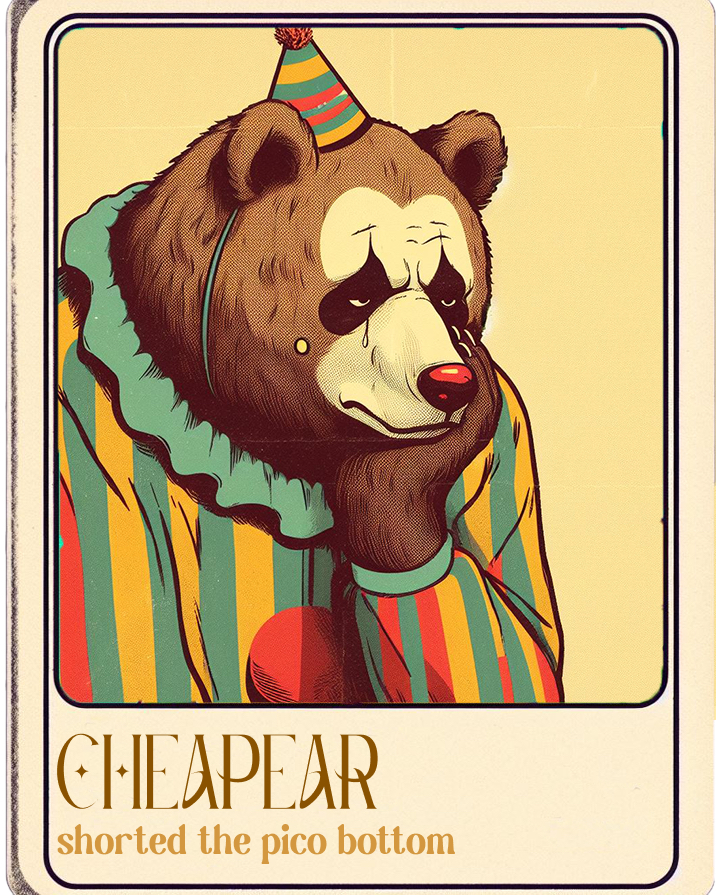Ok so before we get into it, some important disclaimers. I am not a mental health professional, and nothing that follows is advice. I’m a basic degen idiot, sharing some thoughts. If you or anyone you know is struggling with mental health, there are trained professionals who can help. Reach out. Speak to the Samaritans and for any emergency call 999 (or equivalent).
What do we mean by Mental Health?
Let’s begin with some definitions. When I say mental health, I mean a spectrum ranging from a bit down, through clinical depression and anxiety, to despair and hopelessness, and finally to suicidal ideations and ultimately suicide itself. Yep, this is going to be a relatively heavy post, for a very heavy topic.
Mental Health also includes the flip-side of this too; the optimism, thrill and euphoria. For the purposes of this post, I’ll be using Mental Health as a catch-all term that encompasses, well, everything we feel.
Feeling & Subjectivity
What we feel is by definition deeply personal and subjective. It’s also really hard to identify. If, dear reader, you are anything like me, you will spend far too much time in your own head, thinking and not feeling. Just identifying what I am feeling, as opposed to thinking, is seriously difficult. On more than one occasion I have caught myself saying “I think I feel ok” - which obviously doesn’t count. That’s in my head, and I’m still thinking - absolute (oxy)moron.
Point being, actually connecting to our feelings is a hard enough task, let alone if what I’m going through is in anyway representative, applicable or of interest to anyone else. The result, it can be a really lonely place.

Stigma & Generational Norms
Perhaps because it is subjective, it’s very hard to talk about. Everyone experiences the same sunshine and rain, and we are damn good weather conversationalists. But something that no one else can see or experience? Now that is not an easy thing to bring up.
Depending on your age and cultural upbringing, you will have experienced differing levels of taboo around discussing mental health. The status quo has very much been 'get on with it', with a 'stiff upper lip’ something we pride ourselves on culturally. For those old enough to remember Princess Diana’s funeral, you may recall Harry and William were being celebrated for not crying - at their own Mother’s funeral!
This stigma is also quite gendered and generational. The Cure let us know that boys don’t cry, presumably because it’s girly, which would be a pussy thing to do. The generational thing makes more sense from a Maslow’s Hierarchy perspective. If your grandad was fighting a war as a teenager, there is understandably little sympathy when we discuss our lack of a fulfilling job with him.
Only relatively recently has there been a push towards ‘it’s ok to not be ok’, but that doesn’t mean any of us are any good at knowing how to not be ok.

Enter Crypto..
All of this is hard enough in the real world, but crypto is a far cry from this. Trouble is, many of us are so far down the rabbit hole, that we’ve lost perspective for what is considered normal. For example, in the last few days I have exchanged messages with my friends PlatoPotato and Zombie, the latter of whom we briefly discussed fathering a baby WaterBear together, when we have amassed enough DNA from staking our Genesis NFTs. The former I am chatting to about a season of duck races involving custom NFT cars. I am genuinely excited about both of these, but outside of this space how much of those sentences mean anything?
Being in a subculture is somewhat of a double-edged sword. You’re buzzing because others have the same niche interest, but it doesn’t travel well outside of the space. However, it’s one thing to turn up at a mate’s house for a LAN party or to session a board game, but crypto being almost completely digital, means most interactions take place behind a pfp mask, an alias, and typed on a keyboard. This can easily lead to miscommunication, a source of stress in itself, however in it’s worst form it creates a fertile environment for trolls.
Buoyed by the safety of their hovel, a troll will engage in comments, discussions and insults they wouldn’t dare say in real life. Despite being spaghetti-armed and allergic to sunlight, they will trash-talk like The Rock in his prime, safe in the knowledge it cannot escalate beyond typing in caps. Most of the time they’re looking for a reaction, which means they use unacceptable language and casual liable. One need only look at the proliferation of Solana N-word or Greta-inspired memecoins to get the idea. It’s something that exists in the 4-chan infested digital world that just doesn’t occur IRL, and it can be hard to deal with.
One of the great things about crypto is it is truly global and there is the opportunity to meet people from everywhere. The downside to this though, is that it never switches off. I get ready to go to bed, and my mate Jim in Australia pops up and suddenly we’re back on it! Telegram groups are always active, and we are an arms-length and a phone pick-up away from engaging, for the nth time today.
Then, add in the one factor we’ve not yet mentioned, which is most people’s number one source of stress…
Money
Let’s not beat around the bush, this is the reason 99.9% of people are here. Yes there are outliers like Satoshi, Vitalik and Dan, who as their core motivation genuinely seem to want to make the world a better place. However for most of us, we recognise disruptive tech, we are $early, and we are hoping to make life-changing amounts.
As John Carter brilliantly explained on our recent Mental Health in Web3 Radix Review, this in itself can be a source of frustration; that others just don’t get it. We have seen what the tech is capable of. It’s secure and fast, and yet outdated and fallible systems prevail, damn it! Why hasn’t this been adopted yet!? I’m paying what to send money abroad? My bank is shut on weekends?! As Nathaniel Lee knew only too well, “They called me mad, and I called them mad, and damn them they outvoted me!”
It’s hard to keep a cool head. Let alone when most people who ever touched crypto are down. It can grow weary to have to keep reminding ourselves that we’re not wrong, just early. Though the more time that passes, the harder it is to keep this conviction.

Then we are faced with a practical question. How much do I put in? It’s tempting to put in every last penny into something that can 5x, 10x, 100x, but as every good trader knows, don’t invest what you can’t afford to lose. So we mostly do that, wishing we had more to throw in, whilst we follow a ramen diet to keep filling bags. Many are then left cash-poor, while we stack soon-to-be magic-internet-money. Then the market sticks a big, middle finger up.
Mental Health within a Market
With the Radix community being so well-read, terms like euphoria and capitulation will no doubt conjure up a particular graphic. If not, perhaps people recognise those emotions from time spent in the market. Either way, it’s an excuse to revisit one of my all-time favourite charts;

The fact that this chart is so well known (and for those of us who have been through a cycle will attest to, so accurate!) tells us everything we need to know about just how emotionally draining this space is! Those highs and lows; euphoria and depression, hope and denial, optimism and anxiety. It’s fucking exhausting.
Wake up to a green candle - it’s gonna be a great day! Wake up to a blood bath, and that might as well be literal. A decent run can have us euphoric and wishing we had bought more. A retrace can be devastating. Another crypto runs, and we want to FOMO into that. Why didn’t I spread my position or re-balance my portfolio??
With so much potential future prosperity at stake, our emotions are often as volatile as the market itself. This isn’t just a 5% retrace, this is me potentially not being able to retire early, or buy that house, or quit my job. The stress of a portfolio depreciating is bad enough, but add to that the future-planning we did, and the opportunity-cost of not having bought some shitty memecoin that did 1000x in the last 6 months, and our mental health can very quickly become severely affected. God-forbid you recommended someone buy a coin that tanked!
The double-standards of Mental Health
If we were to have a conversation with someone who we thought was experiencing any of the above, we would all instantly become expert psychologists; “take some time for yourself, stop looking at the charts, spend more time with friends and family”. And yet, when it’s us who are in the situation, we struggle to follow those simple suggestions. Similarly, we want people to share their burdens with us, but we are reluctant to disclose what we are going through. Be it through pride, ego or lack of practice, we’re all little Frodo’s refusing to share the load.
We do the same with work. When Dan said he couldn’t make Radix Review a couple of weeks ago because of an event in London, my immediate thought was ‘I hope they’re going to the theatre or a night out or something fun!’ - but when it’s us in that situation, we seldom give ourselves that grace. We burn the candle at both ends, burn the midnight oil and risk burn-out.
Ok it’s intense - what do we do?
What, you thought the conclusion to this post was going to cure Mental Health? Within a volatile, degen and troll infested, asynchronous digital magic-internet-money ecosystem?! No. I have no answers. I simply hope that in writing about it, we don’t suffer alone.
One of the best things about this space is the communities we are a part of. Lean on them. Sometimes it can be as simple as dm-ing someone to have a little vent, or a quick call.
As much as possible, try to look after yourself. This can be something as simple as a bit of time away from charts, putting your phone away, or a Magnum almond.
For anything more serious, reach out. There is literally no shame in not being ok, it’s a fun but really fucking intense environment. No matter where you are, someone is available who can help, and things can and often do get better.
If you liked this piece and want to support, please consider staking to our Validator







